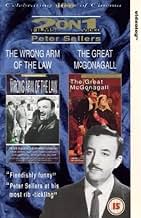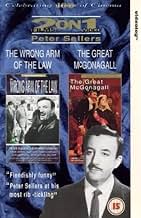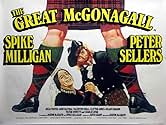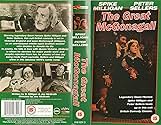Aggiungi una trama nella tua linguaWilliam Topaz McGonagall, the world's greateset poet. Unfortunately the whole of the rest of the world disagreed. His talent made him a sort of Victorian Chris Evans but without the cash.William Topaz McGonagall, the world's greateset poet. Unfortunately the whole of the rest of the world disagreed. His talent made him a sort of Victorian Chris Evans but without the cash.William Topaz McGonagall, the world's greateset poet. Unfortunately the whole of the rest of the world disagreed. His talent made him a sort of Victorian Chris Evans but without the cash.
- Regia
- Sceneggiatura
- Star
Charlie Young Atom
- Postman
- (as Charlie Atom)
- …
Lewis Alexander
- Member of Royal Entourage
- (non citato nei titoli originali)
Malou Cartwright
- Barmaid
- (non citato nei titoli originali)
Walter Henry
- Theatre Audience
- (non citato nei titoli originali)
Aileen Lewis
- Member of Royal Entourage
- (non citato nei titoli originali)
Tony Mendleson
- Theatre Audience
- (non citato nei titoli originali)
Reg Thomason
- Theatre Audience
- (non citato nei titoli originali)
John Wilder
- Theatre Audience
- (non citato nei titoli originali)
Recensioni in evidenza
10jvframe
McGonagall is presented as a believably bad poet - someone you could expect to outsell all other Scottish poets combined, simply because his work is so mind-bogglingly banal.
This is an extremely charming, outrageously funny and also tragic film. There is no doubt that some will not be able to tolerate the amount of pathos generated by a good and simple man (like Nathan in Steve Martin's "The Jerk") who just wanted to follow his heart and do his best in life.
McGonagall puts all his heart and soul into his renditions (each one beginning with blood-curdling moan) and yet he is mercilessly scoffed at by the cognoscenti.
McGonagall's fictional poems will haunt you for life, and you'll never be able to see a simple object like a cow or a bridge without being tempted to burst into a long "Ooooooooooooooh!". Peter Sellers also makes a charming brief appearance as Queen Victoria.
This is an extremely charming, outrageously funny and also tragic film. There is no doubt that some will not be able to tolerate the amount of pathos generated by a good and simple man (like Nathan in Steve Martin's "The Jerk") who just wanted to follow his heart and do his best in life.
McGonagall puts all his heart and soul into his renditions (each one beginning with blood-curdling moan) and yet he is mercilessly scoffed at by the cognoscenti.
McGonagall's fictional poems will haunt you for life, and you'll never be able to see a simple object like a cow or a bridge without being tempted to burst into a long "Ooooooooooooooh!". Peter Sellers also makes a charming brief appearance as Queen Victoria.
10chikuzen
This is the film that "Wind From the East" so desperately wanted to be. Deconstructs itself before your very eyes. Hilarious and mystifying. Spike Milligan and Joe McGrath were made for each other. And Peter Sellers is on board too. I find it hard to believe this classic of the Cinema of the Absurd is so little known. But then so is McGrath -- the Edgar G. Ulmer of British comedy. While Richard Lester is more associated with "The Goon Shpw" -- thanks to "The Running Jumping and Standing Still Film," it's McGrath who conveys the true Goonish sense of intellectual lunacy. The fact that the entire film is shot inside of a theater -- used to suggest the whole world -- is especially novel and fascinating.
Spike Milligan never got an even break. After he redefined comedy and pop culture on the radio with his scripts and performances on "The Goon Show," driving himself in the process to a nervous breakdown, he had to watch while his flabby "Goon Show" partner Peter Sellers became a film comedy superstar. By the time Milligan was well enough to try his own hand at film acting, it was already the 1970s and he had become passe.
His biggest stab at cinematic glory, "The Great McGonagall," reveals he might have gotten out of the looney bin a little too early. Portraying a talentless Scottish poet, Milligan overacts his way through a punchy script he co-wrote with director Joseph McGrath. Sellers appears too, as Queen Victoria, and ironically the two former Goons - who used to play dozens of roles apiece each week on the radio - stick to single characters while other actors, including Victor Spinetti of "A Hard Day's Night" and "Help!," are given the task of performing multiple parts.
It's a strange film that breaks down in the second half, much the way Milligan must have in real life. Still, the script offers hints of the great Goonish humor that launched a comedy revolution.
"Knock, knock." Who says that? "A wee postman who canna reach the knocker," is the reply.
There's strange bits of self-indulgence, too. Scenes are broken up by actors shoving pies in each other's faces, and at one point Milligan forgets his line, whereupon the cameras continue to run as the director and other actors coach him on what to say. It's very bizarre, and might even be fascinating, but for the fact that the story on screen is too slender to brook such diversions.
Sellers, the one name actor in this film, is given little to do as Queen Victoria but perform reaction shots, and occasional witty lines like "Does anyone know a good solicitor" when her Prince Albert locks lips with a male messenger. The early 1970s were a dry period for Sellers, and "The Great McGonagall" was no exception. Albert wears a kilt but otherwise dresses like Hitler, a tiny joke which Milligan and the filmmakers beat into the ground. Valentine Dyall, a dead ringer for Ian McKellen, comes off best in a series of roles that include Alfred Lord Tennyson and a Zulu messenger.
"The Great McGonagall" no doubt amused its makers, who thought it would be funny to send up a bad poet endlessly mocked by fate and society, but on screen it's no "Ed Wood" of poesy. Its too disjointed, too mean-spirited. It's the product of a man who has seemingly given up on life, and wants to hit his audience upside the head with its sordid futility. Milligan, a comic genius who never got his due on screen, had reason to be depressed, but you do not. Give this a miss.
His biggest stab at cinematic glory, "The Great McGonagall," reveals he might have gotten out of the looney bin a little too early. Portraying a talentless Scottish poet, Milligan overacts his way through a punchy script he co-wrote with director Joseph McGrath. Sellers appears too, as Queen Victoria, and ironically the two former Goons - who used to play dozens of roles apiece each week on the radio - stick to single characters while other actors, including Victor Spinetti of "A Hard Day's Night" and "Help!," are given the task of performing multiple parts.
It's a strange film that breaks down in the second half, much the way Milligan must have in real life. Still, the script offers hints of the great Goonish humor that launched a comedy revolution.
"Knock, knock." Who says that? "A wee postman who canna reach the knocker," is the reply.
There's strange bits of self-indulgence, too. Scenes are broken up by actors shoving pies in each other's faces, and at one point Milligan forgets his line, whereupon the cameras continue to run as the director and other actors coach him on what to say. It's very bizarre, and might even be fascinating, but for the fact that the story on screen is too slender to brook such diversions.
Sellers, the one name actor in this film, is given little to do as Queen Victoria but perform reaction shots, and occasional witty lines like "Does anyone know a good solicitor" when her Prince Albert locks lips with a male messenger. The early 1970s were a dry period for Sellers, and "The Great McGonagall" was no exception. Albert wears a kilt but otherwise dresses like Hitler, a tiny joke which Milligan and the filmmakers beat into the ground. Valentine Dyall, a dead ringer for Ian McKellen, comes off best in a series of roles that include Alfred Lord Tennyson and a Zulu messenger.
"The Great McGonagall" no doubt amused its makers, who thought it would be funny to send up a bad poet endlessly mocked by fate and society, but on screen it's no "Ed Wood" of poesy. Its too disjointed, too mean-spirited. It's the product of a man who has seemingly given up on life, and wants to hit his audience upside the head with its sordid futility. Milligan, a comic genius who never got his due on screen, had reason to be depressed, but you do not. Give this a miss.
There is a classic volume edited by Wyndham Lewis and another entitled "The Stuffed Owl: An Anthology of Bad Verse". The book illustrated the worst poets and poetry (in the opinion of the editors) in modern English literature (Shakespeare and his contemporaries, and Medieval masters like Chaucer, were not included). Incredibly the editors not only included poets who were deservedly forgotten (the bland and self-satisfied Martin Tupper, or Edward Foote, who footnoted his poems to verify what he meant, or Poet Laureates like Alfred Austin) some of the great poets slipped too. Wordsworth, Poe, Byron, Tennyson, Longfellow (for "Excelcior") were in the book. I recommend it for people who want to enjoy the pratfalls of poesy (which can be very odd indeed).
Oddly enough William MacGonigal is not included in the collection. Yet he is generally chosen as the example of the worst poet of Victorian Britain. He was the only one who never realized it. He was a dreamer - one day he was in bed and suddenly realized he wanted to be a poet...a great poet. He then proceeded to write poetry, and would do so until he died. There was absolutely nothing anyone of his serious contemporaries ever saw in his work to grant it merit. He certainly was not in the same category of Tennyson or Wordsworth or Byron (despite their occasional lapses). Yet he actually tried to become poet laureate. Given that (after Tennyson died in 1892) Alfred Austin finally got chosen (Wilde, Kipling, and William Morris were not considered politically correct enough for different reasons - Austin was a good Tory policy propagandist), MacGonigal could have served that political occasion job. He would have enjoyed it.
Today, actually, his poetry sells well (some say it sells better than Tennyson, Matthew Arnold, or Robert Browning). It has a beguiling beat, likened to calypso in rhythm. His fairly simple line of English vocabulary is quick to grasp among people struggling to learn our language. And (unlike Tennyson and most of the others) a movie was made about his life. Spike Milligan finally got the lead role in his career (remember "Postman's Knock" - I suppose not) that was worth remembering. Sellers was given an interesting cameo as Queen Victoria. Not a great film, but an interesting one.
Oddly enough William MacGonigal is not included in the collection. Yet he is generally chosen as the example of the worst poet of Victorian Britain. He was the only one who never realized it. He was a dreamer - one day he was in bed and suddenly realized he wanted to be a poet...a great poet. He then proceeded to write poetry, and would do so until he died. There was absolutely nothing anyone of his serious contemporaries ever saw in his work to grant it merit. He certainly was not in the same category of Tennyson or Wordsworth or Byron (despite their occasional lapses). Yet he actually tried to become poet laureate. Given that (after Tennyson died in 1892) Alfred Austin finally got chosen (Wilde, Kipling, and William Morris were not considered politically correct enough for different reasons - Austin was a good Tory policy propagandist), MacGonigal could have served that political occasion job. He would have enjoyed it.
Today, actually, his poetry sells well (some say it sells better than Tennyson, Matthew Arnold, or Robert Browning). It has a beguiling beat, likened to calypso in rhythm. His fairly simple line of English vocabulary is quick to grasp among people struggling to learn our language. And (unlike Tennyson and most of the others) a movie was made about his life. Spike Milligan finally got the lead role in his career (remember "Postman's Knock" - I suppose not) that was worth remembering. Sellers was given an interesting cameo as Queen Victoria. Not a great film, but an interesting one.
This movie uses the poems of William McGonagall in form of theater and fantasies to tell the story of this most famous bad verse poet who completely left his day job to become a poet and perform for Queen Victoria.
This movie is not for all tastes and definitely not a commercial type one, but if you can get into the subject and the style its hilarious!
This movie is not for all tastes and definitely not a commercial type one, but if you can get into the subject and the style its hilarious!
Lo sapevi?
- QuizWilliam Topaz McGonagall was, in fact, a real poet. He is considered the worst poet ever, and Spike Milligan and Peter Sellers read his poems to one another frequently.
- Citazioni
William McGonagall: Is anything worn under the kilt?
John Brown: No, everything is in working order.
- Colonne sonoreThis Goodbye
Written by Spike Milligan
I più visti
Accedi per valutare e creare un elenco di titoli salvati per ottenere consigli personalizzati
Dettagli
- Data di uscita
- Paese di origine
- Lingua
- Celebre anche come
- Den store McGonnagal
- Luoghi delle riprese
- Aziende produttrici
- Vedi altri crediti dell’azienda su IMDbPro
- Tempo di esecuzione1 ora 35 minuti
- Mix di suoni
Contribuisci a questa pagina
Suggerisci una modifica o aggiungi i contenuti mancanti

Divario superiore
By what name was The Great McGonagall (1975) officially released in Canada in English?
Rispondi



























